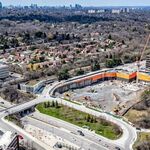W. K. Lis
Superstar
^Yeah those posts will do nothing to stop a driver veering into you. It's a false comfort.
Hitting just one of those posts should wake the motorist up, however.
^Yeah those posts will do nothing to stop a driver veering into you. It's a false comfort.
both of those lanes don't look inviting, at all. not only should they be raised cycle tracks but with roads that wide there should be a buffer zone.Why are we so bad at building protected bike lanes. In ottawa they have just lined bike lanes but they have a post to deter drivers. It's so easy to do it!?!? Why does millwood bridge have nothing. I feel scared whenever buses go right past me with no distanceView attachment 198730View attachment 198731
Why are we so bad at building protected bike lanes. In ottawa they have just lined bike lanes but they have a post to deter drivers. It's so easy to do it!?!? Why does millwood bridge have nothing. I feel scared whenever buses go right past me with no distanceView attachment 198730View attachment 198731
^Yeah those posts will do nothing to stop a driver veering into you. It's a false comfort.
Here is an easy solution.both of those lanes don't look inviting, at all. not only should they be raised cycle tracks but with roads that wide there should be a buffer zone.
"GRRR!" The Automobile god growled.
Passed - staff to report by year end 2019 on creating cycling super highways (motion wording) along all rail corridors that traverse Toronto
Maybe my dreams of a cycling super highway along the Richmond Hill GO line is one step closer to reality.
I think priority is making sure that it connects with the Finch Hydro Corridor, which is more or less essentially already a cycling super-highway.A quick glance at satellite photos suggests there is sufficient room in the corridor, including existing rail bridges to extend the trail from York Mills to Sheppard. Getting in/around Oriole GO is a minor pain, but there seems to be room.
The main issue is that the spare ROW space is not necessarily on the same side as the spare space on the rail bridge. But that's a fairly easy fix. There is, however, no extra room on the rail bridge north of Sheppard over the East Don, and that would be expensive to fix. There's one or two others north of there as well.
But at Sheppard you could link into the existing valley trail system, which will get you to Leslie/Steeles.
Extending north of there following the Leslie Street ROW looks pretty straight-forward, then into German Mills Park its easy enough to get as far up as the 407 corridor. That would probably be the more cost-effective bet.
Here is an easy solution.
Extend the sidewalk onto the roadway, put bike lane on said sidewalk. Done.
That easy solution was something I remember seeing while biking around Warsaw circa 2002 as a child. I remember thinking about how safe it felt compared to on-street cycling.
If a post-communist depression economy can figure out, surely so can Toronto.
I think priority is making sure that it connects with the Finch Hydro Corridor, which is more or less essentially already a cycling super-highway.
The bridge over Leslie and Oriole GO station is a pain to resolve. Back when I thought about the potential of this route, it was with the notion that GO Service along the Richmond Hill line would be discontinued in favour of superior options via the Yonge North and Relief Line North extensions, which would have rendered space on the bridge a moot point.
Perhaps there could be a way to connect from Leslie south of the 401 to the Betty Sutherland Trail on the other side of the Don (or if there is room, a new route on the west side of the Don behind North York General), and then an alignment up Leslie Street. It defeats the idea of a cycling superhighway though, in my opinion.
I wouldn't want my wife or daughters cycling along some seculed rail corridor. Cycle paths should run alongside the roads, not railways.Maybe my dreams of a cycling super highway along the Richmond Hill GO line is one step closer to reality.
I wouldn't want my wife or daughters cycling along some seculed rail corridor. Cycle paths should run alongside the roads, not railways.
I wouldn't want my wife or daughters cycling along some seculed rail corridor. Cycle paths should run alongside the roads, not railways.




